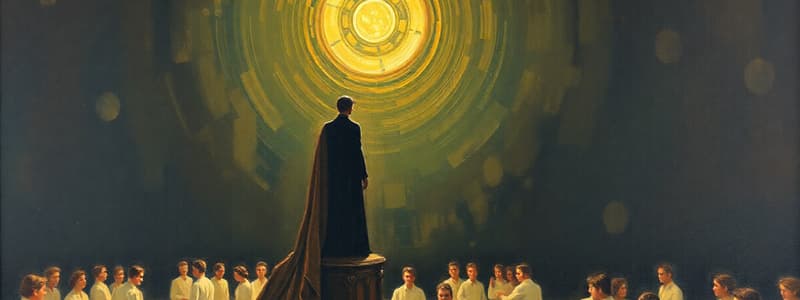Podcast
Questions and Answers
The Rhetorical Tradition is solely focused on the analysis of nonverbal communication.
The Rhetorical Tradition is solely focused on the analysis of nonverbal communication.
False (B)
Semiotics involves the study of signs and symbols and their meanings.
Semiotics involves the study of signs and symbols and their meanings.
True (A)
Phenomenology is concerned with how individuals experience the world directly.
Phenomenology is concerned with how individuals experience the world directly.
True (A)
Maslow’s Hierarchy of Needs is primarily linked to the Cybernetic Tradition.
Maslow’s Hierarchy of Needs is primarily linked to the Cybernetic Tradition.
The Cybernetic Tradition analyzes how elements within complex systems interact and influence each other.
The Cybernetic Tradition analyzes how elements within complex systems interact and influence each other.
Logos, Ethos, and Pathos are modes of persuasion identified in the Semiotic Tradition.
Logos, Ethos, and Pathos are modes of persuasion identified in the Semiotic Tradition.
Ferdinand de Saussure was a key figure in the study of Cybernetic communication systems.
Ferdinand de Saussure was a key figure in the study of Cybernetic communication systems.
The five canons of rhetoric are invention, arrangement, style, memory, and delivery.
The five canons of rhetoric are invention, arrangement, style, memory, and delivery.
Norbert Weiner's work emphasized the importance of the feedback mechanism in systems.
Norbert Weiner's work emphasized the importance of the feedback mechanism in systems.
The Sociocultural Tradition in communication emphasizes the biological factors influencing behavior.
The Sociocultural Tradition in communication emphasizes the biological factors influencing behavior.
Critical scholars analyze communication forms to perpetuate societal oppression.
Critical scholars analyze communication forms to perpetuate societal oppression.
Lev Vygotsky's principles suggest that development is solely an individual process.
Lev Vygotsky's principles suggest that development is solely an individual process.
Cybernetics is one of the theories used to understand systems in communication.
Cybernetics is one of the theories used to understand systems in communication.
The Behavioral branch in the Sociopsychological Tradition focuses on unobservable thoughts.
The Behavioral branch in the Sociopsychological Tradition focuses on unobservable thoughts.
Critical Race Theory is a theory that plays a role in the Critical Tradition of communication.
Critical Race Theory is a theory that plays a role in the Critical Tradition of communication.
Philosophical Assumptions are the guidelines that emerge from a communication theory.
Philosophical Assumptions are the guidelines that emerge from a communication theory.
Flashcards
Rhetorical Tradition
Rhetorical Tradition
Communication as an art focused on persuasive speaking/writing.
Five Canons of Rhetoric
Five Canons of Rhetoric
Invention, arrangement, style, memory, and delivery—elements of persuasive speaking.
Logos, Ethos, Pathos
Logos, Ethos, Pathos
Greek modes of persuasion (logic, credibility, emotion).
Semiotic Tradition
Semiotic Tradition
Signup and view all the flashcards
Signifier/Signified
Signifier/Signified
Signup and view all the flashcards
Phenomenological Tradition
Phenomenological Tradition
Signup and view all the flashcards
Cybernetic Tradition
Cybernetic Tradition
Signup and view all the flashcards
Co-cultural Theory
Co-cultural Theory
Signup and view all the flashcards
System Concept in Communication Theory
System Concept in Communication Theory
Signup and view all the flashcards
Sociopsychological Tradition
Sociopsychological Tradition
Signup and view all the flashcards
Behavioral Branch (Sociopsych)
Behavioral Branch (Sociopsych)
Signup and view all the flashcards
Cognitive Branch (Sociopsych)
Cognitive Branch (Sociopsych)
Signup and view all the flashcards
Sociocultural Tradition
Sociocultural Tradition
Signup and view all the flashcards
Critical Tradition
Critical Tradition
Signup and view all the flashcards
Communication Theory Dimensions
Communication Theory Dimensions
Signup and view all the flashcards
Lev Vygotsky's Ideas (Sociocultural)
Lev Vygotsky's Ideas (Sociocultural)
Signup and view all the flashcards
Study Notes
Communication & Media Theories Overview
- Seven distinct communication traditions examine interpersonal and societal dynamics.
- Each tradition highlights specific aspects of communication in human interaction.
Seven Traditions of Communication Theories
1. Rhetorical Tradition
- Communication as an art form, focused on persuasion through effective speaking and writing.
- Key figures include Corax, Aristotle, Plato, and Socrates.
- Five canons of rhetoric: invention, arrangement, style, memory, and delivery.
- Persuasive appeals include Logos (logical reasoning), Ethos (credibility), and Pathos (emotional appeal).
2. Semiotic Tradition
- Explores how signs and symbols represent concepts.
- Key figures include Ferdinand de Saussure and Charles Sanders Peirce.
- Signs have a signifier (form) and a signified (concept).
- Shared meaning is crucial for effective communication.
3. Phenomenological Tradition
- Examines how humans perceive the world through direct experiences.
- Interpretation is central.
- Individuals shape their reality through interaction.
- Examples include Co-cultural theory (Orbe) and Maslow's Hierarchy of Needs.
4. Cybernetic Tradition
- Studies complex systems where elements interact and influence each other.
- Norbert Weiner (1948) focused on message transmission within systems.
- Systems include inputs, processing, and outputs, with feedback mechanisms.
- System concepts, cybernetics, and general systems theory are examples.
5. Sociopsychological Tradition
- Studies individuals in social contexts, focusing on how social interaction impacts behavior.
- Divided into three branches: behavioral, cognitive, and biological.
- Behavior focuses on observable actions; Cognitive investigates mental processes; Biological examines physiological factors.
6. Sociocultural Tradition
- Explores how societal norms, roles, and rules shape communication interactions.
- Lev Vygotsky's work shows that children develop knowledge through interaction.
- Development is influenced by social context, with language key to mental development.
- Development is influenced by learning.
7. Critical Tradition
- Analyzes how communication perpetuates power dynamics and societal oppression.
- Critiques power structures and ideologies, affecting society.
- Influenced by feminist theory, queer theory, post-modern, and post-colonial discourse.
- Examples include Critical Race Theory and Queer Theory.
Dimensions of Communication Theories
- Philosophical Assumptions: Foundational beliefs guiding the theory.
- Concepts: Essential ideas forming the theory.
- Explanations: Connections and relationships explained by the theory.
- Principles: Guidelines for action derived from the theory.
- Effective theories include at least three of these dimensions.
Studying That Suits You
Use AI to generate personalized quizzes and flashcards to suit your learning preferences.



